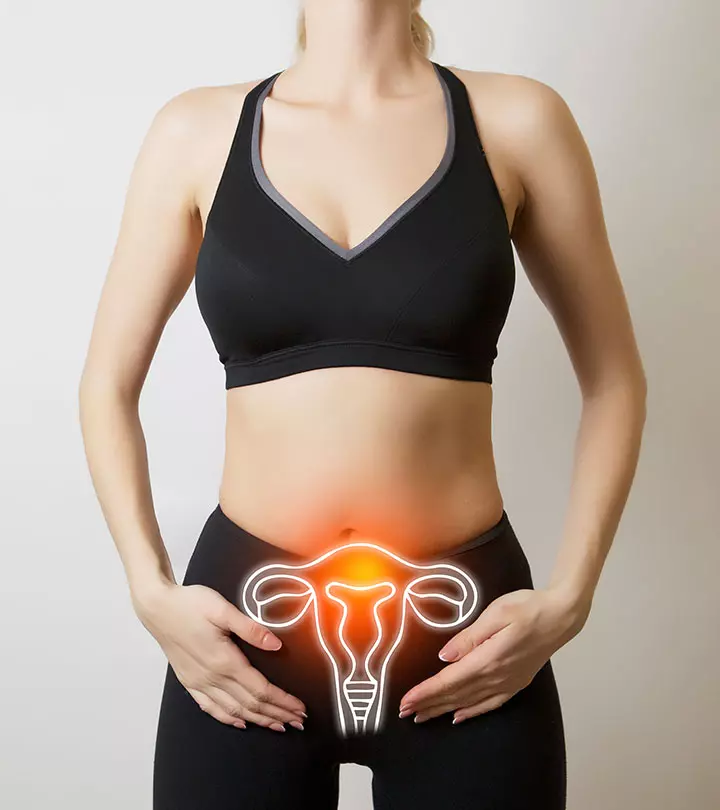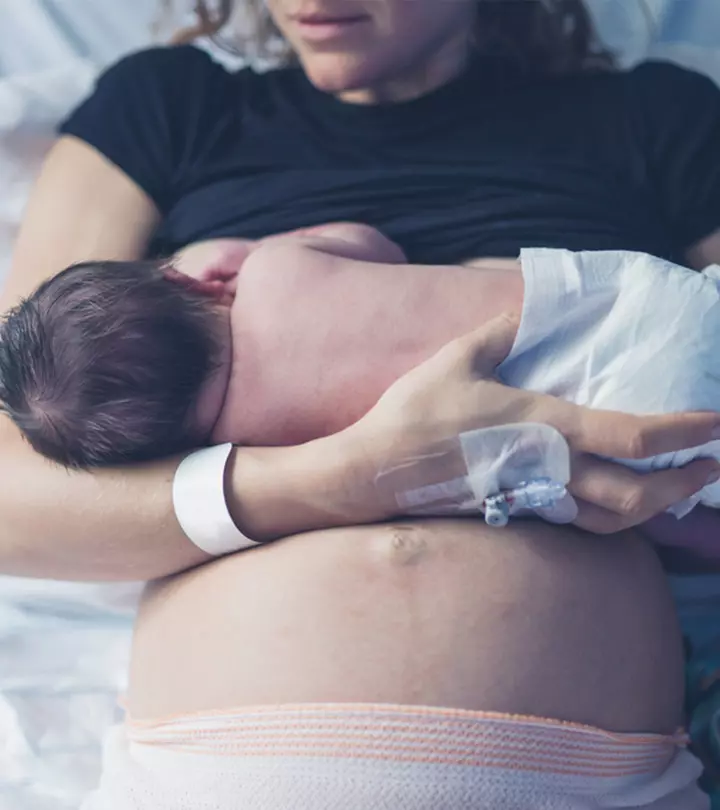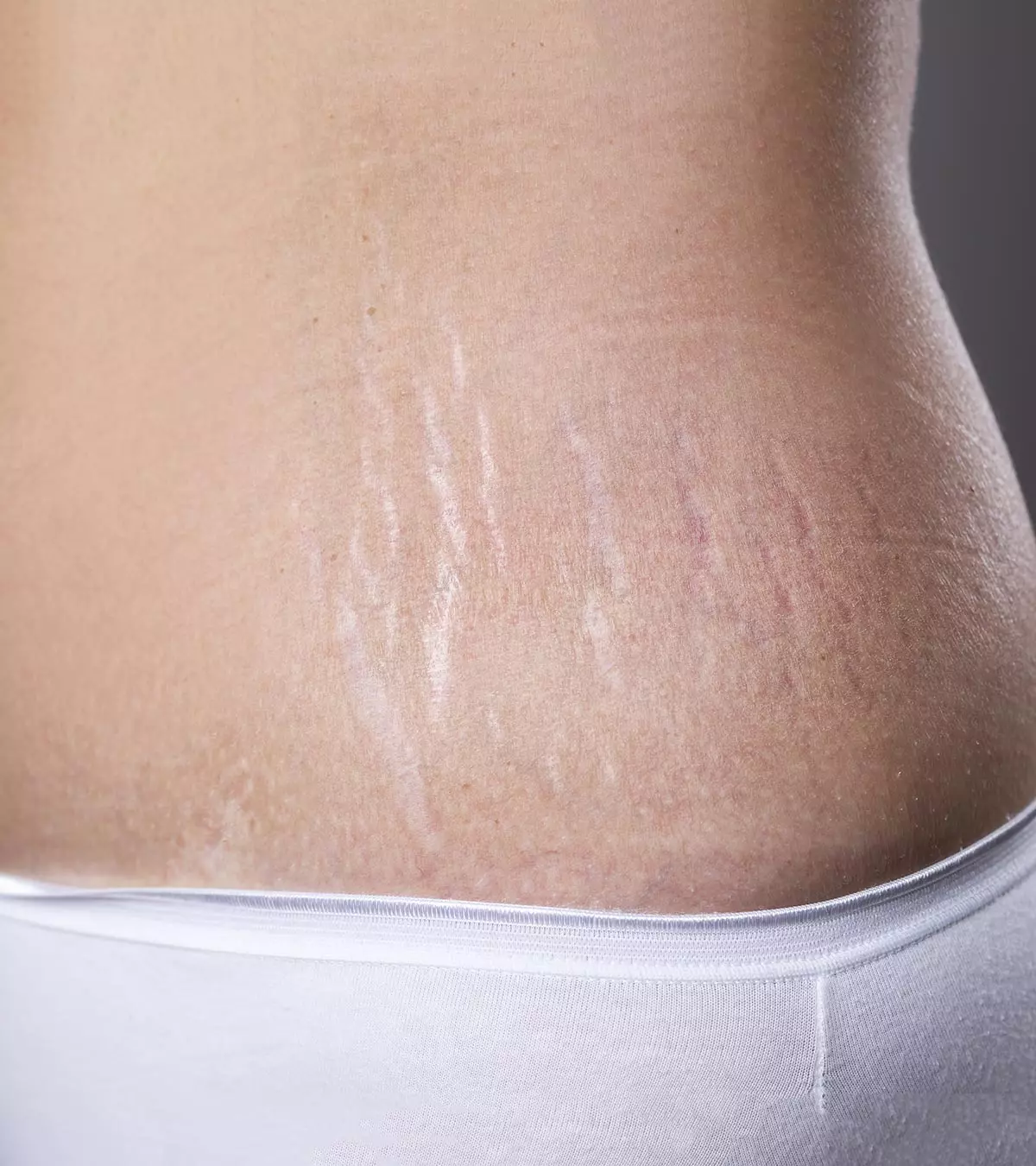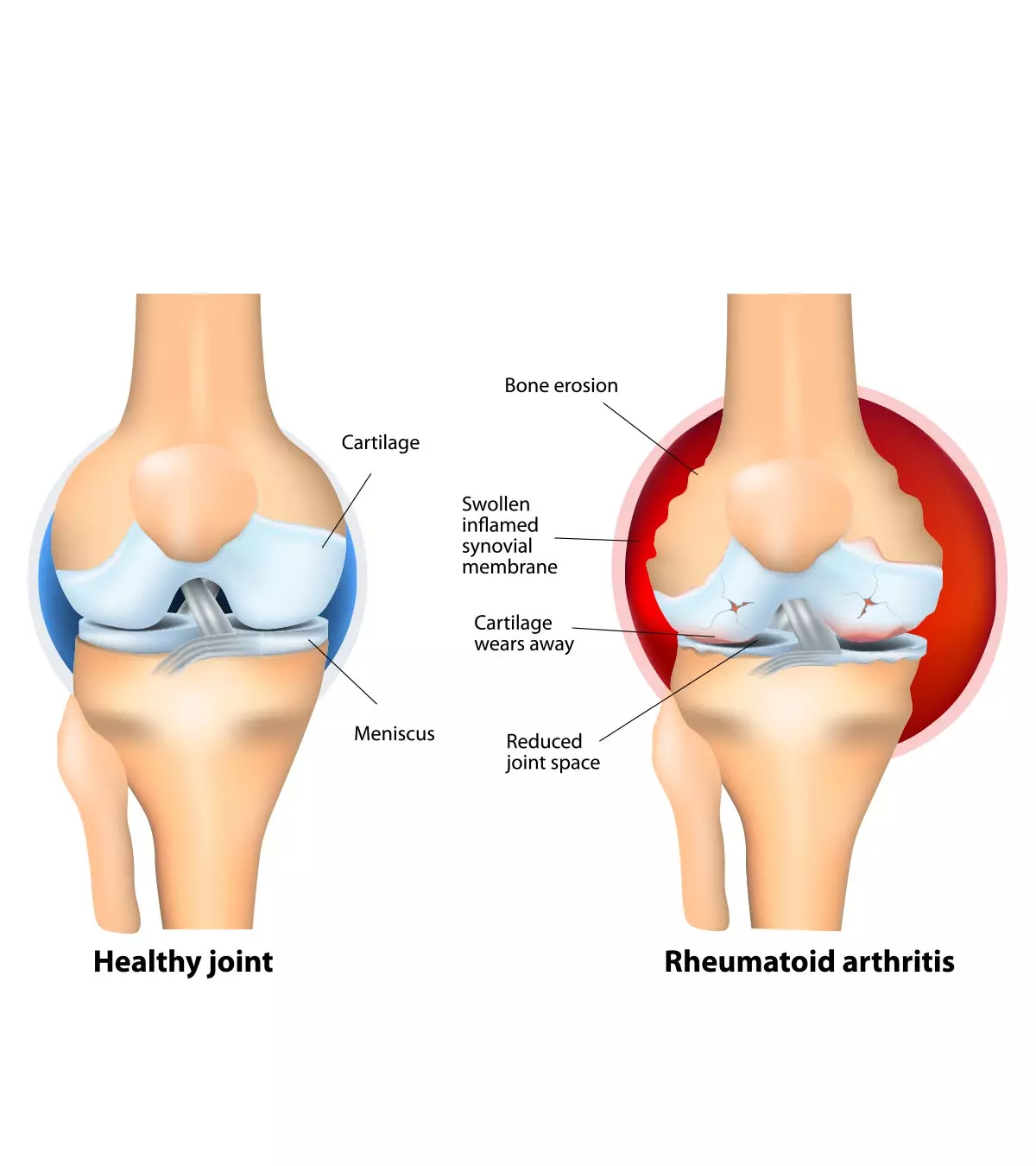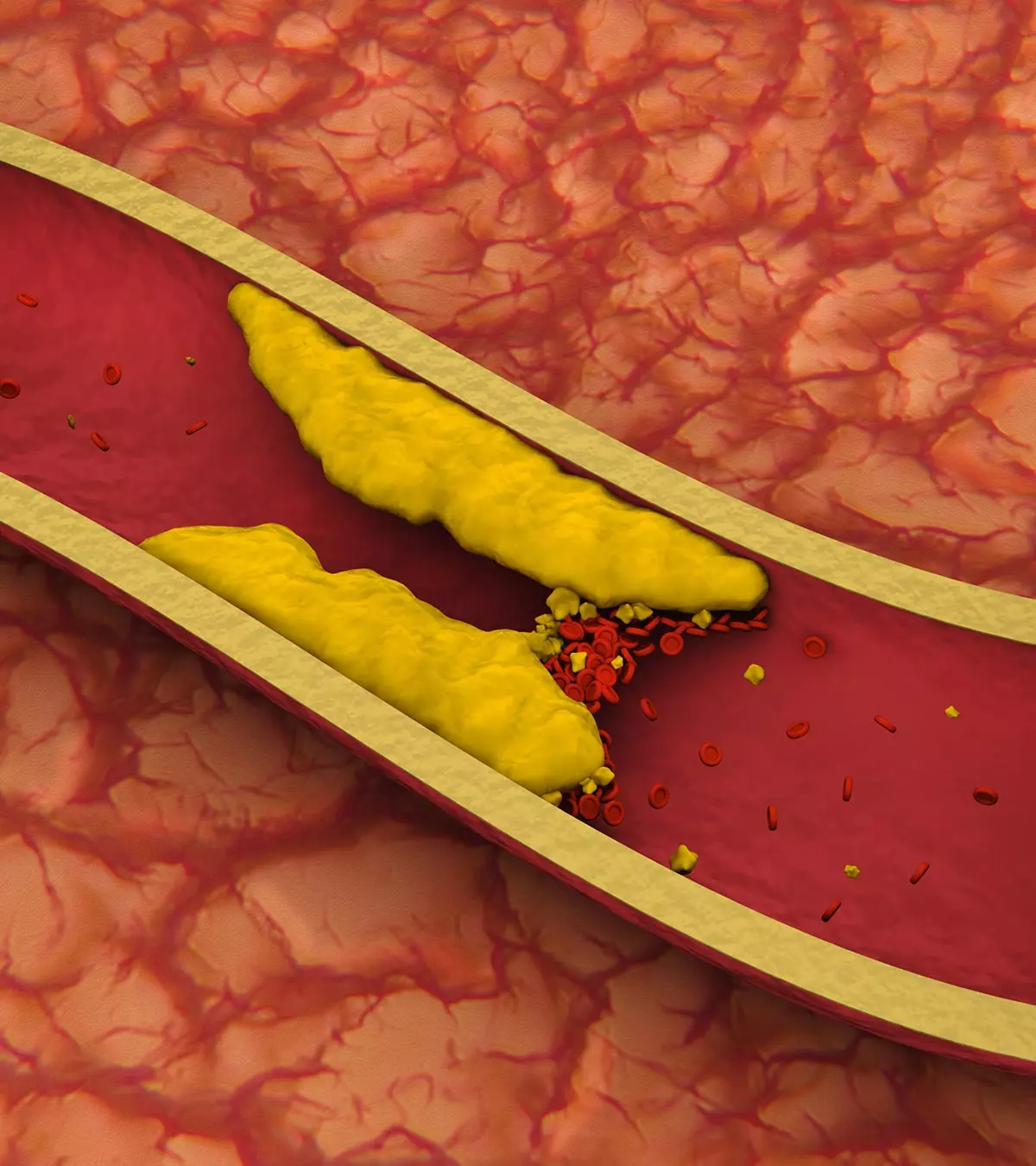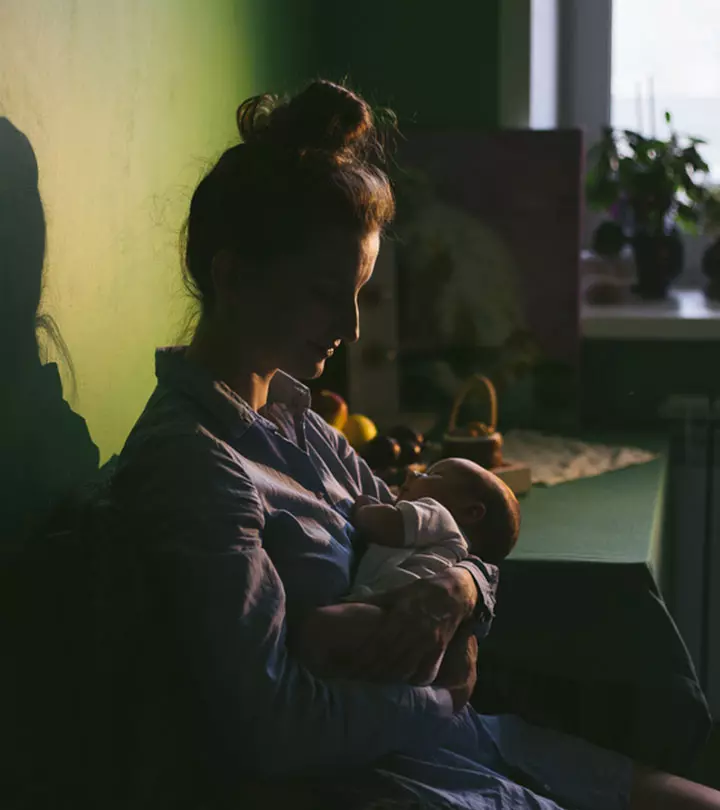
Image: Shutterstock
Postpartum insomnia is defined as trouble falling and staying asleep during the phase after delivery

. It may be characterized by sleep disturbance such as suddenly waking up in the middle of the night and not going back to sleep for the rest of the night.
The major cause of sleepless nights during the postpartum period is the drastic change in hormones during and after pregnancy. If your insomnia symptoms last for more than three to four weeks, you should seek medical help as chronic insomnia may sometimes be a risk factor for postnatal depression (1). Read on to know about the causes, symptoms, treatment, prevention, and management of postpartum insomnia.
Read on to know about the causes, symptoms, treatment, prevention, and management of postpartum insomnia.
Key Pointers
- The sleep patterns of a new mother may change due to hormonal changes, stress, and nighttime feeding, leading to sleep disorders such as insomnia.
- Symptoms of postpartum insomnia include constant fatigue, poor sleep quality, and feelings of depression.
- Treatments for insomnia may include lifestyle changes, therapy, and medications.
- Mothers can prevent postpartum insomnia by exercising, eating well, and sleep training their baby.
Is It Normal To Have Insomnia After Childbirth?
Yes. Sleep deprivation or lack of sleep is a common occurrence after childbirth. It usually resolves in a few weeks as you and your baby adjust to a daily routine. However, if your symptoms of difficulty falling asleep or wakefulness after sleep onset last for more than three to four weeks in the postpartum period, you should consult your doctor and talk about ways to improve your sleep efficiency (1).
What Causes Postpartum Insomnia?
The change in the mother’s circadian rhythmiChanges in the body, mind, and behavior of living organisms that occur on a 24-hour cycle is the primary cause of lack of sleep during pregnancy and postpartum
. Circadian rhythm changes may occur due to the following reasons and factors (2) (3).
- Decreased production of progesteroneiA female reproductive hormone that plays an important role in menstruation, pregnancy, and breastfeeding which has sleep-inducing properties, leads to postpartum hormone imbalance.
- Nighttime feedings, which often cause sleep interferences and lead to exhaustion and mood swings.
- Stress of taking care of the baby

- Erratic sleep schedule of the baby during the first few months
- Constant needs of the baby, such as diaper changes even during the middle of the night
- Changes in the regular sleep schedule as a result of adjusting to motherhood
What Are The Symptoms Of Postpartum Insomnia?
Nighttime sleeplessness and the inability to fall asleep after waking up abruptly, at night are the most notable symptoms of postpartum insomnia. You may also experience the following symptoms.
- Constant fatigue
- Increased sleepiness during odd hours, such as increased daytime napping

- Overwhelming emotions and depressive symptoms
- Poor sleep quality during all times
A mother of three, Amy Kiefer recalls her experience dealing with the symptoms of postpartum insomnia. She says, “For a year and a half after giving birth to my third child, a full night’s sleep eluded me like some kind of impossible dream. In retrospect, it is clear that I was suffering from chronic insomnia, and it persisted long after my daughter had started sleeping through the night… Whether I was exhausted or well rested, every night, I would lay awake from 2 or 3 am until 5:30 am, running over my problems in the most negative possible light, and despising myself for being unable to fall back asleep. Then, at dawn, I would finally fall into a deep sleep, only to awaken an hour or so later. The effects on my ability to function were severe: My nerves felt constantly frayed, my patience was thin, and my mind felt like it was encased in cotton. Overall I felt like I was constantly running on empty, pushing myself to get through my day (i).”
 Did you know?
Did you know?Is Insomnia Linked To Postpartum Depression And Anxiety?
Postpartum insomnia may be interrelated to depression and anxiety during the postpartum period.
The report from a study conducted by a couple researchers from multiple institutions state that postpartum depression (PPD) occurs in almost 6.5 to 20% of women. In addition, the results of a cohort study state that causes and symptoms of postpartum depression and postnatal insomniaiA condition after childbirth where women may be unable to fall or remain asleep consistently are interrelated, with insomnia acting as the precursor and negative prognostic and negative prognostic factoriA factor that may be used to predict whether a patient will recover from an illness or if the disease will return for depression and anxiety disorders (4).
Insomnia is one of the several factors that may contribute to the risk of postpartum depression and anxiety. However, a study noted the two to be potentially bidirectional, meaning women with existing postpartum depression and anxiety may have a risk of developing postpartum insomnia (5).
 Research finds
Research findsWhat Is The Treatment For Postpartum Insomnia?
The treatment options may vary based on several factors such as the severity of insomnia and whether it interferes with your ability to breastfeed and care for the baby. Your doctor may consider the following treatment options (6).
1. Lifestyle changes
Postpartum insomnia may usually be managed with lifestyle changes
. These may include the following interventions.
- Changing your sleep habits. An example is sleeping when your baby sleeps, ensuring you get sleep whenever possible.
- Creating a soothing bedtime routine. It includes having a warm bath before bedtime. Self-care may help reduce the stress that often arises during the postpartum period.
- Delegating responsibilities. For instance, you may ask your partner or a family member to change the baby’s diapers or soothe them at night for every alternate night.

- Feeding expressed breast milk. If your sleep is often disturbed due to the baby demanding a feed at night, you may express breast milk and ask your partner or a family member to feed it.
- Breastfeeding in lying down position at night
2. Therapies
Cognitive-behavioral therapy (CBT) and light-dark therapy (LDT) are some of the common therapies considered for treating postpartum insomnia (7) (8).
- Cognitive-behavioral therapy: It involves various techniques to modulate your thoughts, breathing, and mindfulness. Your therapist may guide you through the process based on their assessment of the causes of postpartum insomnia in your case.
- Light-dark therapy: It involves managing the amount of exposure you have to natural and artificial light in the day and after sunset. This may involve using light-blocking glasses after sunset to minimize exposure to artificial light.
3. Medications
The medicines you have during lactation may reach breast milk from where they can reach the baby’s body. Therefore, medications, especially sleeping pills while breastfeeding may be considered the last resort if other interventions yield no results.
Insomnia medicines and dosage may depend on various factors, such as the severity of insomnia, the age of your baby, and the frequency of breastfeeding. Some of the common medicines prescribed for insomnia include melatonin, ramelteon, antihistaminesi Medications that help relieve allergic symptoms , antidepressants, and other sleep-inducing agents.
Are There Ways To Prevent Postpartum Insomnia?
Treatment for insomnia may also help you deal with your sleeplessness. Besides that, the following practices and measures may help you sleep better and avoid postpartum insomnia.
- Get back to exercising: If your doctor has given you the green light for going back to the gym or exercising, some lightweight exercises may help you de-stress and make you tired, making falling asleep easier.

- Monitor your time of food intake: Research has shown that consuming food right before going to sleep or having a heavy dinner in the nocturnal period may negatively affect sleep quality (9). You may keep the portion size small and avoid caffeine, which may interfere with sleep.
- Keep nighttime care brief: In case your baby wakes up during the night for feedings or diaper changes, ensure that you do not take too long to put them back to sleep. This will also help you in falling back to sleep easily.
- Sleep training: If your baby wakes up frequently during the night, talk to your pediatrician about the ways and advantages of sleep training. Having a set sleep time and routine for the baby may benefit them and you as well.
- Try relaxation techniques: Manage postpartum stress, which may lead to postpartum insomnia. Some effective interventions to relax your mind include meditation, yoga, breathing exercises, and reading books on harboring a positive mindset.

Along with these measures, you may consider other ways to maintain good sleep hygiene such as having a proper sleeping environment, maintaining quiet time for bedtime, and having a quiet, dark bedroom. You may also avoid screen time before going to bed.
Frequently Asked Questions
1. What is postpartum psychosis?
Postpartum psychosis is a mental health condition that affects women after giving birth. Women with this condition may experience hallucinations, depression, lack of energy, restlessness, confusion, and sleeplessness (10).
2. How much sleep do I need postpartum?
aAfter the birth of your baby, you need enough sleep to feel rested and rejuvenated. The number of hours of sleep required may vary from one woman to another. However, it has been found that most women get an average of six hours of sleep every night. Here are some strategies you may follow to get more sleep and stay energetic (11) (12).
- In the first few weeks, accept help and let someone else take most of your responsibility.
- Sleep along with your baby.
- Practice relaxation techniques such as deep breathing and meditation.
- Keep the bedroom temperature and light conducive to sleep.
3. What is postpartum blues?
Postpartum blues refers to the mild psychiatric illness that a woman goes through after having a baby. This condition often develops two to three days after childbirth and resolves within two weeks. The symptoms of postpartum blues may be depression, anxiety, sadness, irritability, and reduced sleep (13).
4. Is postpartum depression a common symptom after pregnancy?
Postpartum depression is characterized by fatigue, anxiety, guilt, and crying. It affects around 15% of women (14).
Postnatal insomnia is a common condition in new mothers. It can make attending to your newborn child and taking care of your needs challenging. Maintaining a set schedule and having a healthy lifestyle may help overcome this condition. Although it usually disappears after a few weeks, it may sometimes linger on for longer periods, leading to chronic maternal insomnia symptoms. In such cases, consult your doctor.
Infographic: Effective Methods To Treat Insomnia In New Mothers
From post-pregnancy pain to taking care of the newborn, there are many causes of sleeplessness after childbirth. While the condition may resolve on its own with time, regular sleepless nights and insomnia may require treatment. Check out the infographic below to learn about treatment options for postpartum insomnia.
Some thing wrong with infographic shortcode. please verify shortcode syntaxIllustration: How Long Does Postpartum Insomnia Last & Sleep Tips To Moms
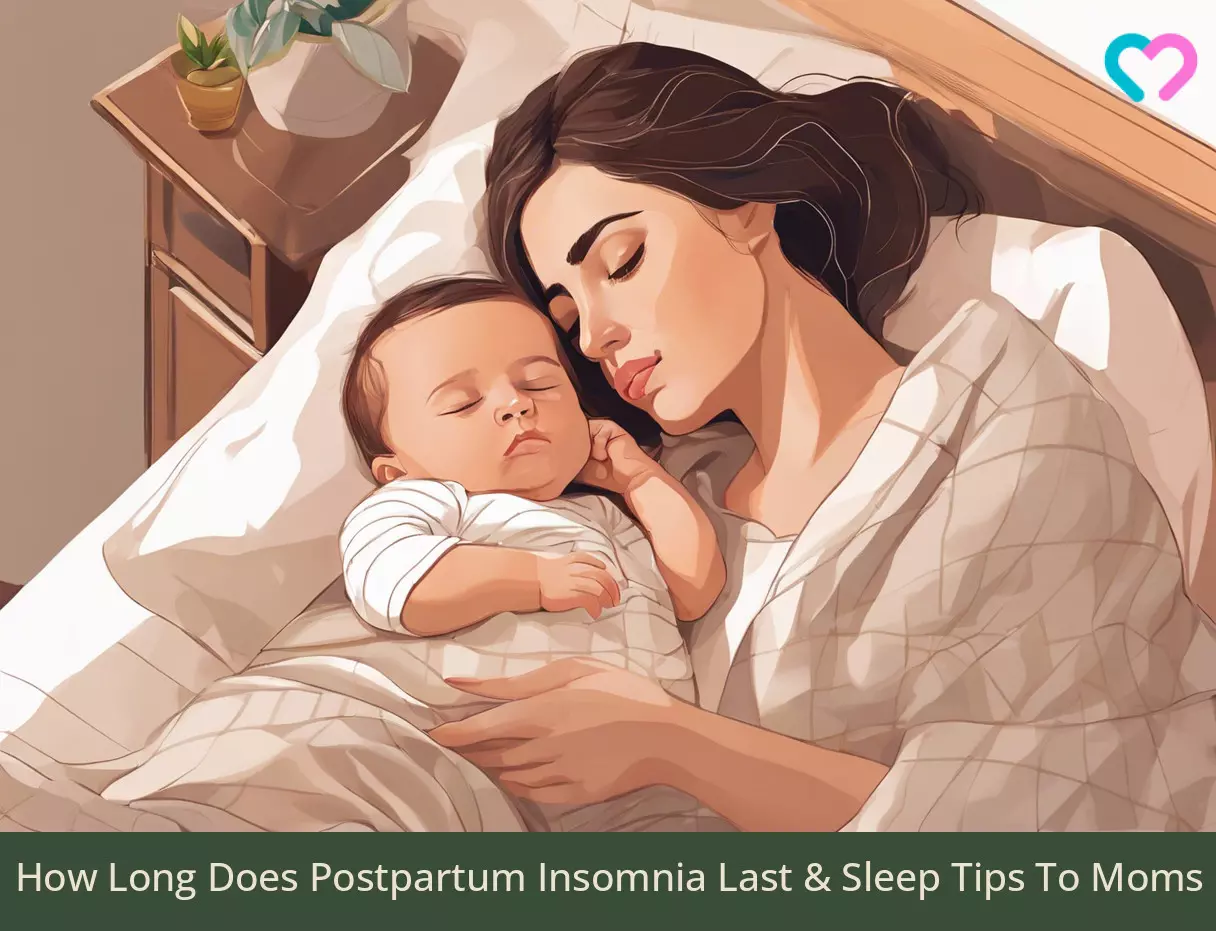
Image: Stable Diffusion/MomJunction Design Team
Personal Experience: Source
MomJunction articles include first-hand experiences to provide you with better insights through real-life narratives. Here are the sources of personal accounts referenced in this article.
i. How I Overcame Postpartum Insomnia.https://caheo.info/tag/sleep/
References
- Leslie M. Swanson; Insomnia and Postpartum Depression: When a New Mom’s Sleep Loss Turns Perilous.
https://www.michiganmedicine.org/health-lab/insomnia-and-postpartum-depression-when-new-moms-sleep-loss-turns-perilous - Laura Creti et al.; (2017); Sleep in the Postpartum: Characteristics of First-time Healthy Mothers.
https://www.ncbi.nlm.nih.gov/pmc/articles/PMC5664311/ - Postpartum Insomnia.
https://www.sleepfoundation.org/insomnia/postpartum-insomnia - Signe Karen Dorheim et al.; (2009); Sleep and depression in postpartum women: a population-based study.
https://academic.oup.com/sleep/article/32/7/847/2679652 - Michele L Okun; (2015); Sleep and postpartum depression.
https://pubmed.ncbi.nlm.nih.gov/26382160/ - Insomnia.
https://med.uth.edu/neurosciences/conditions-and-treatments/sleep-disorders/insomnia/ - Sumedha Verma et al.; (2025); Cognitive behavioral therapy and light-dark therapy for maternal postpartum insomnia symptoms: protocol of a parallel-group randomized control efficacy trial.
https://www.frontiersin.org/journals/global-womens-health/articles/10.3389/fgwh.2025.591677/full - Cyril Manning; (2025); The Best Treatment for Insomnia Usually Isn’t a Pill.
https://magazine.ucsf.edu/best-treatment-insomnia-usually-isnt-pill - Cibele Aparecida Crispim et al.; (2011); Relationship between food intake and sleep pattern in healthy individuals.
https://www.ncbi.nlm.nih.gov/pmc/articles/PMC3227713/ - Postpartum psychosis.
https://www.nhs.uk/mental-health/conditions/post-partum-psychosis/#:~:text=Postpartum%20psychosis%20is%20a%20serious,as%20the%20%22baby%20blues%22 - Postpartum Insomnia.
https://www.sleepfoundation.org/insomnia/postpartum-insomnia - The New Mother: Taking Care of Yourself After Birth.
https://www.stanfordchildrens.org/en/topic/default?id=the-new-mother-taking-care-of-yourself-after-birth-90-P02693 - Kripa Balaram and Raman Marwaha; (2025); Postpartum Blues.
https://www.ncbi.nlm.nih.gov/books/NBK554546/ - Postpartum Depression.
https://my.clevelandclinic.org/health/diseases/9312-postpartum-depression
Community Experiences
Join the conversation and become a part of our nurturing community! Share your stories, experiences, and insights to connect with fellow parents.
Read full bio of Dr. Anita Gupta
Read full bio of Sanjana Bhattacharjee
Read full bio of Rebecca Malachi
Read full bio of Reshmi Das






